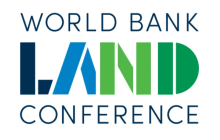Reducing Informal Urban Expansion by Engaging Rural Councils in Land Pooling and Subdivision
The session explored strategies to curb informal urban expansion by involving rural councils in proactive land pooling and subdivision, highlighting approaches from diverse global contexts. The discussion opened with Shlomo Angel's presentation on "Laying out the urban periphery before it is occupied," emphasizing the importance of preemptive urban planning to guide orderly growth at the city’s edges. This was followed by a presentation from Ricardo Fort Meyer, who introduced a toolkit designed for land subdivision in Dar Es Salaam, Tanzania, focusing on tools and practices to structure land development before informal settlements take hold. Bizualem Admasu Nesir discussed a pilot project in Ethiopia’s Hawassa that adopts a "planned informality" approach, proposing methods to integrate informal settlements into formal urban systems with minimal disruption. Davie Chilonga presented the rapid land conversion and registration initiatives underway in four Malawian cities, showcasing efforts to formalize land use quickly and support urban planning.
The session emphasized that involving rural councils in land planning is essential to managing urban expansion sustainably. Case studies underscored the need for coordinated approaches that balance rapid urbanization pressures with the desire to avoid chaotic, unplanned growth. The open discussion highlighted best practices and potential pitfalls in implementing preemptive land planning, underscoring the challenges of maintaining flexibility while ensuring regulatory compliance. Key takeaways included the importance of adaptable policy frameworks, the engagement of local stakeholders, and the creation of land registration systems that facilitate both orderly urbanization and the protection of rural land interests. The session concluded by emphasizing the need for continued innovation in land pooling and subdivision strategies to support sustainable urban expansion.
This resource has been made available by the organizers of the World Bank Land Conference under the following disclaimer.
This resource has been made available by the organizers of the World Bank Land Conference under the following disclaimer.


